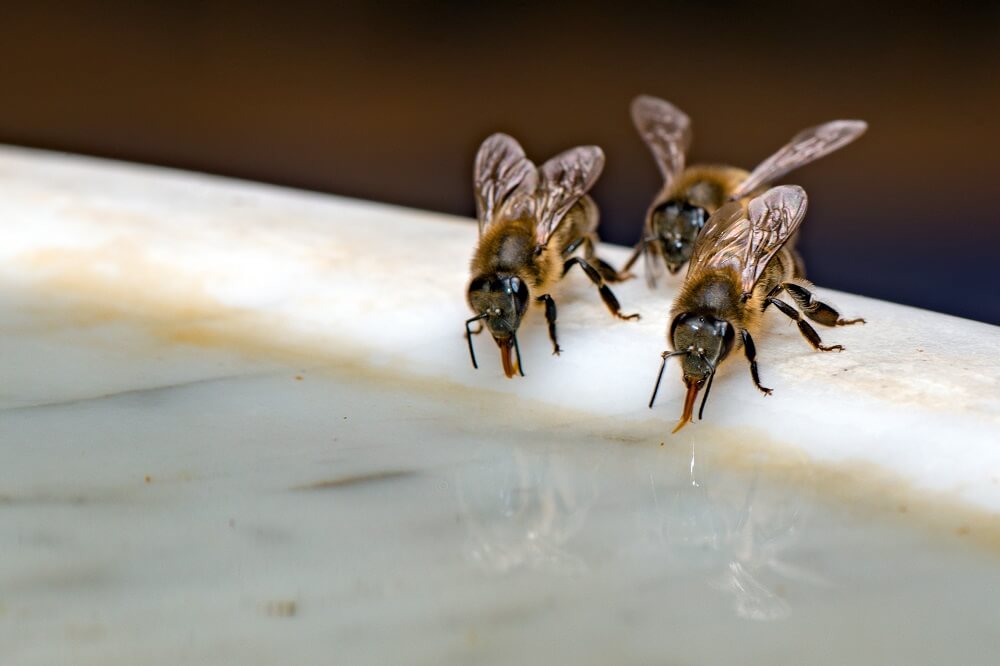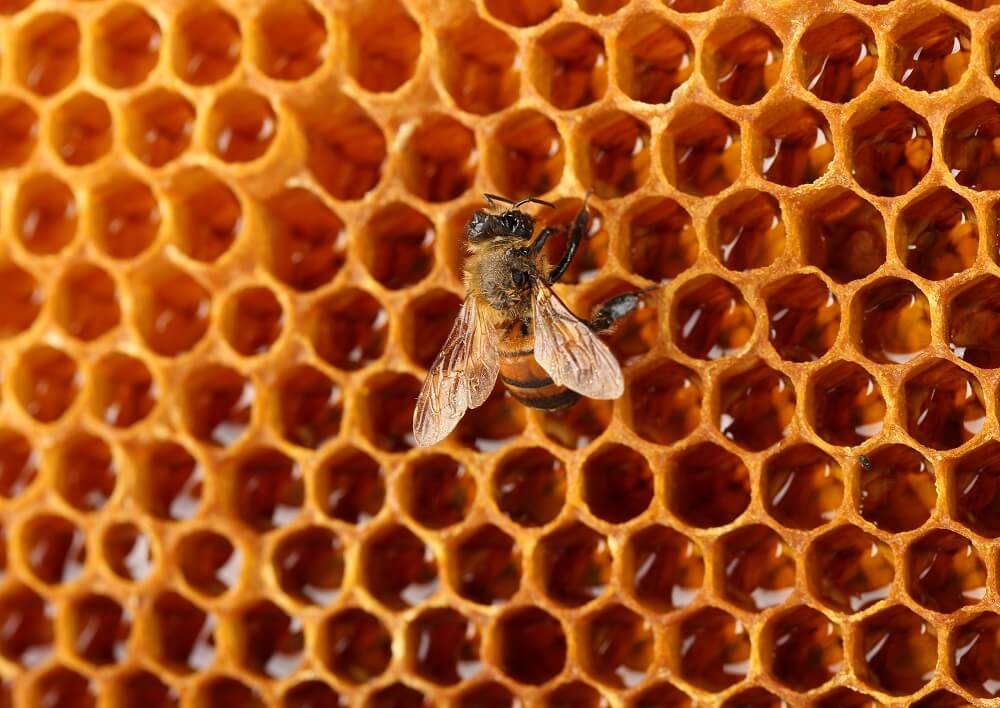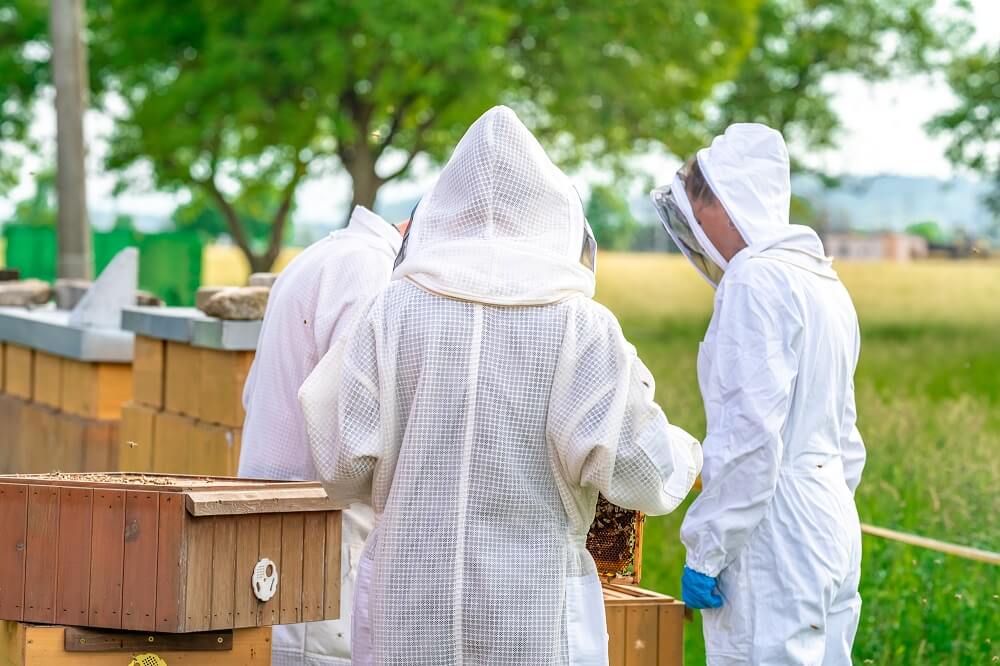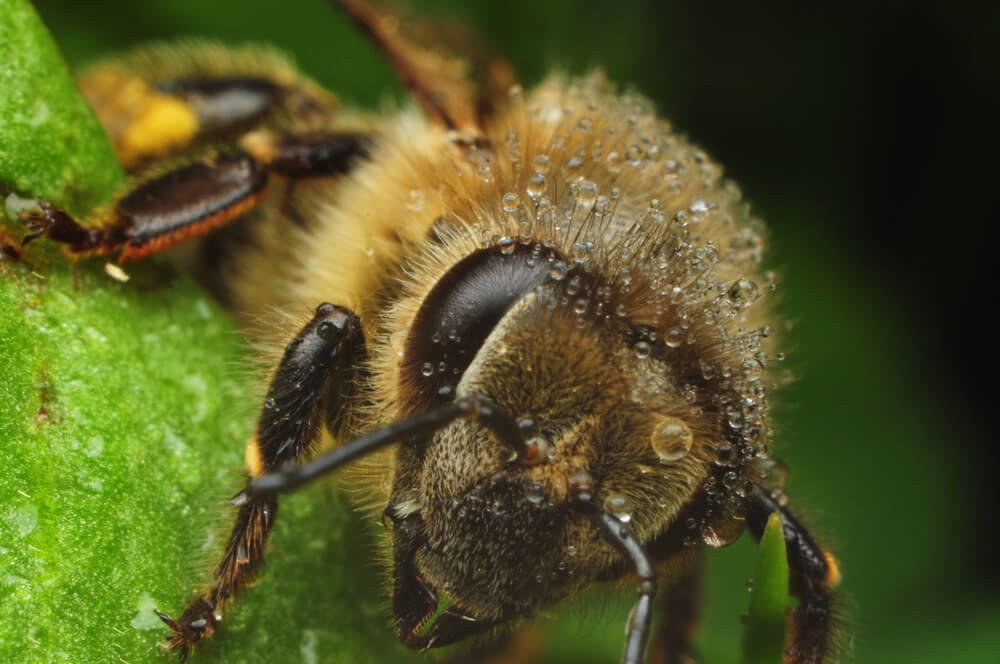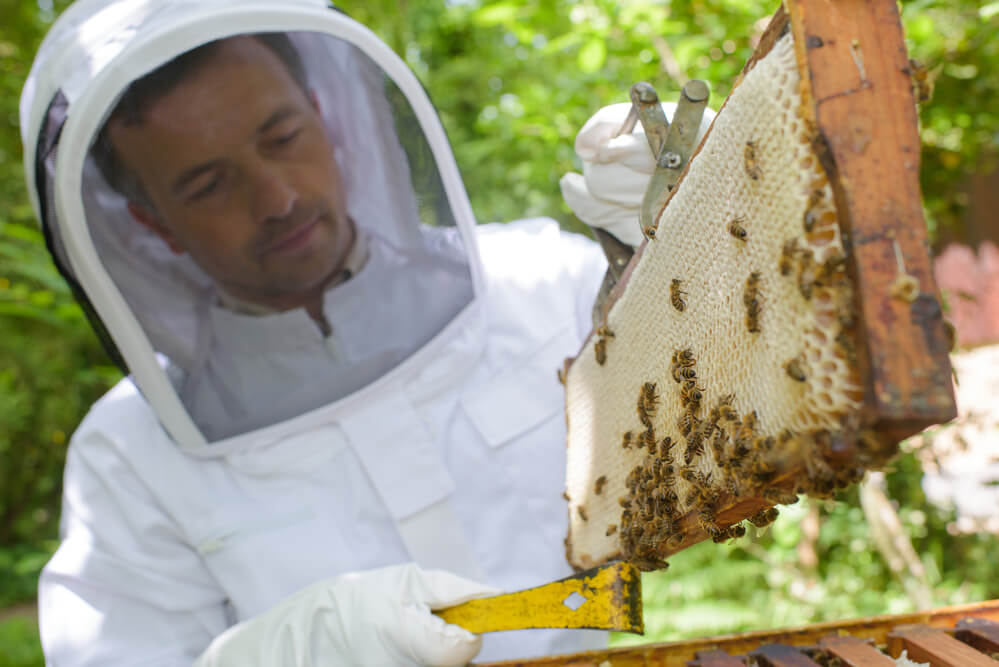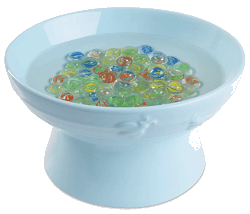Let’s face it.
You should pat yourself on the back for wanting to help bees.
More specifically, you’re looking for bee waterers because you’re either:
- A beekeeper who wants to help your hive or;
- A good samaritan who wants to help your local bee population
Either way, you’re doing a good thing because bees need access to safe water sources.
This is especially important considering that bees and other pollinators are also responsible for one in every three bites of food we eat.(1)
That said, there are two ways you can have a safe bee watering station:
Click which one applies to you, and we’ll go from there.
3 Simple DIY Bee Waterers
Bee waterers are so simple to make.
More importantly?
You can make a bee waterer using stuff you probably already have at home. And if you have to buy anything, it’ll only cost you a few bucks.
Ready?
Let’s get started.
1. Turn a Bird Bath into a Bee Watering Station
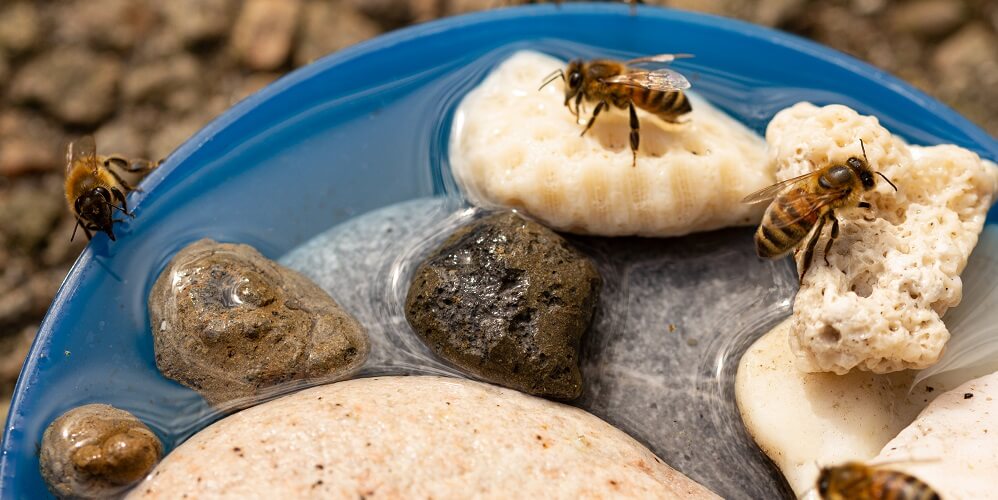
- A shallow birdbath to hold water
- Marbles, rocks, or crystals for safe landing perches
- A few drops of lemongrass oil to attract the bees to the new water source
Birdbaths are an excellent starting point for DIY honeybee watering stations. They also can help a variety of bees including bumblebees, mason bees, sweat bees, and beyond.
But here’s the thing:
Even though birdbaths are typically shallow, they can still be dangerous for bees who fall in.
Remember:
Bees can’t swim. So if you don’t add any landing perches like marbles to your birdbath, then you can wake up to find several drowned bees.
Not good.
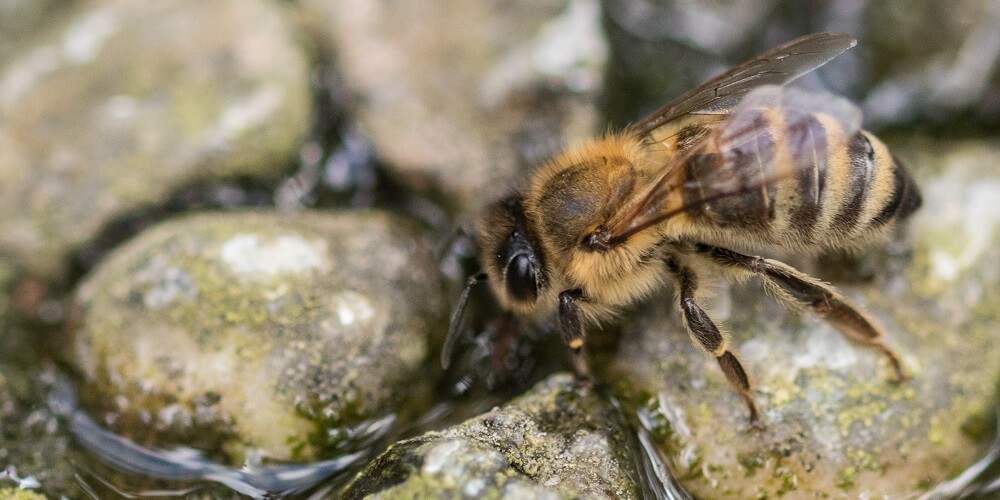
But the good news?
It’s an easy fix. Bee watering stations with marbles, rocks, or crystals will do the trick.
- Place your marbles, rocks, or crystals into your birdbath
- Fill your birdbath with water
- Make sure the tops of the marbles are above the waterline so the bees can perch safely
- Add a few drops of lemongrass oil to get the bees attention
Voila! You did it.
If you need some bee waterer inspiration, I recommend using this birdbath. It’s small and shallow, making it the perfect size for bees to drink from.
The birdbath is also beautiful, so it’s a wonderful addition to any backyard beekeeping garden.
For landing perches, here are a few of our recommendations:
2. Use a Self-Dispensing Water Bowl
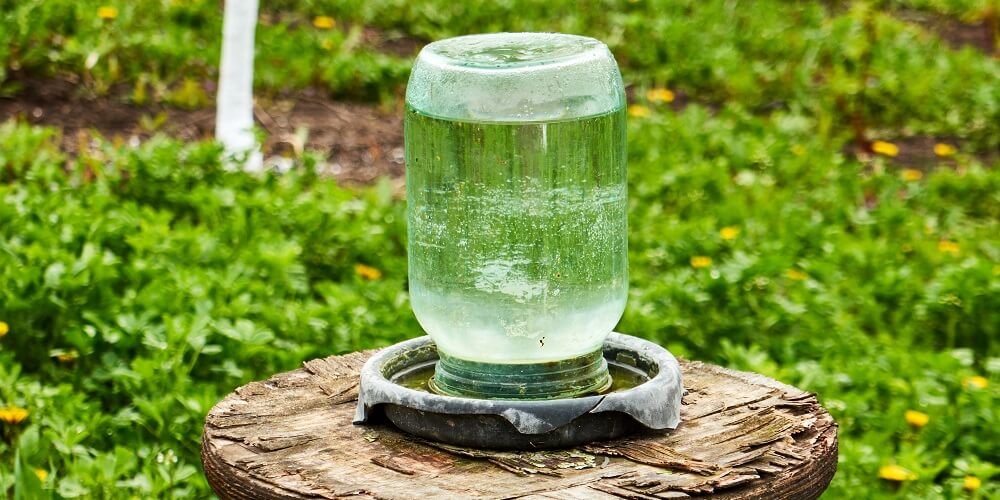
- Self-dispensing water bowl for holding water
- Rocks, crystals, or marbles to provide safe landing perches for the bees
- A few drops of lemongrass oil to entice the bees to come to the new water
I know what you’re thinking:
Wait, it’s that easy?
Yup. Self-filling water bowls with rocks are a safe and simple way to attract bees. These automatic bee waterers are perfect if you’re short on time and can’t refill your bee water feeders often.
But there’s one important note:
Self-dispensing water bowls can be deep, so make sure you add rocks, crystals, or marbles around the edges. This gives your bees somewhere safe to perch while they drink water.
Like this:
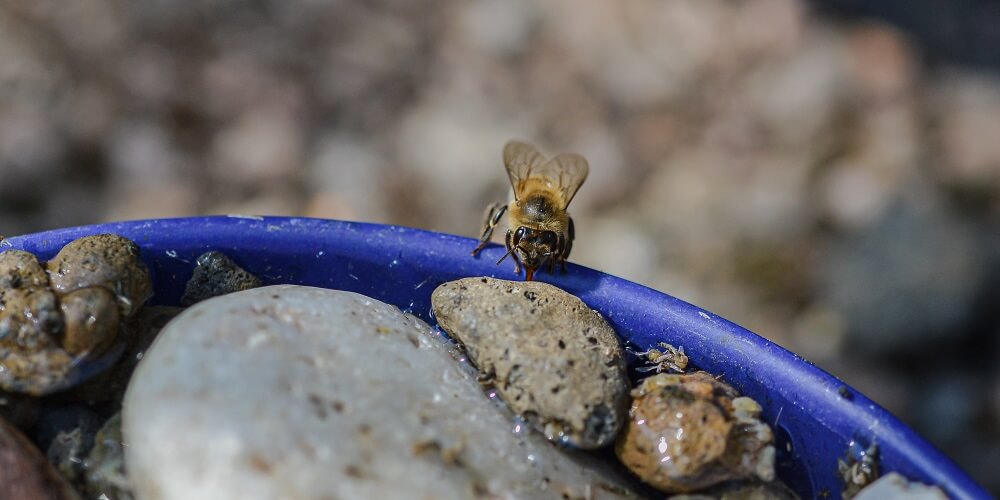
Final point:
Some people use hummingbird feeders for their bee waterers. But, I don’t recommend it.
Why?
Because you don’t want hummingbirds and bees attracted to the same place.
Here’s the thing:
While bees and wasps won’t intentionally go out of their way to sting a hummingbird, it does happen.
And if it does, a bee or wasp sting can be deadly to a hummingbird because its body is tiny and can’t absorb the venom.(2)
That said, hummingbirds aren’t typically attracted to self-dispensing bowls that aren’t specifically designed for them. That’s why I recommend those for bees instead of hummingbird feeders.
- Add water to your bowl
- Add a few drops of lemongrass oil to grab the bees attention
- Place rocks, marbles, or crystals along the edges
3. Add Rocks or Marbles to a Shallow Plate
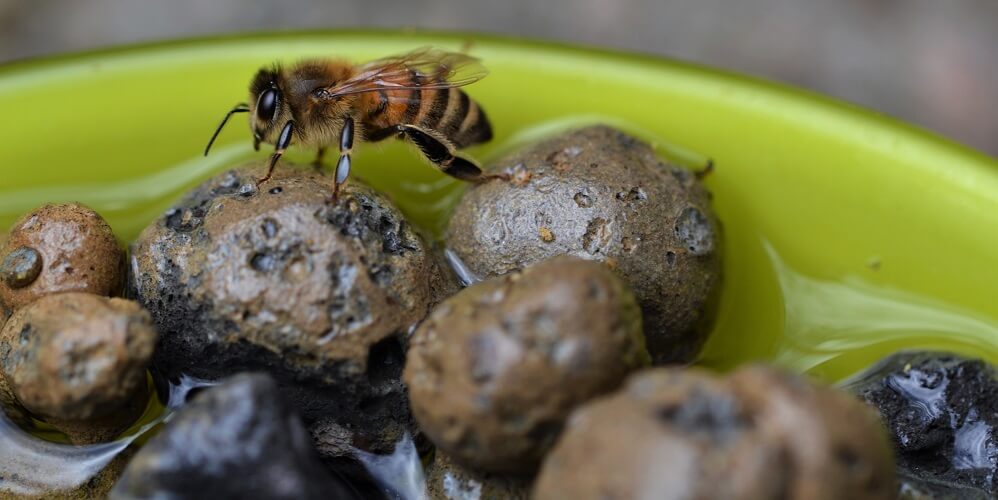
- A shallow pasta plate to use as a water bowl
- Marbles, rocks, or crystals so the bees can drink safely
- A few drops of lemongrass oil to attract bees to their new water dish
This bee water feeder is easy because it uses things you already have at home.
I find that pasta dishes work the best because they have a fillable center. They also have sides that allow the bees to perch for easy access.
- Put marbles, rocks, or crystals in the center of the plate
- Pour your water, making sure that the waterline stays below the marbles, rocks, or crystals
- Add a few drops of lemongrass oil to help the bees find your water bowl
4 Pre-Made Bee Waterers That Your Bees Will Love
Are you short on time and looking for something pre-made? Or maybe you’re looking for something other than our bee water station ideas?
Check these out:
1. Navaris Bee Watering Station
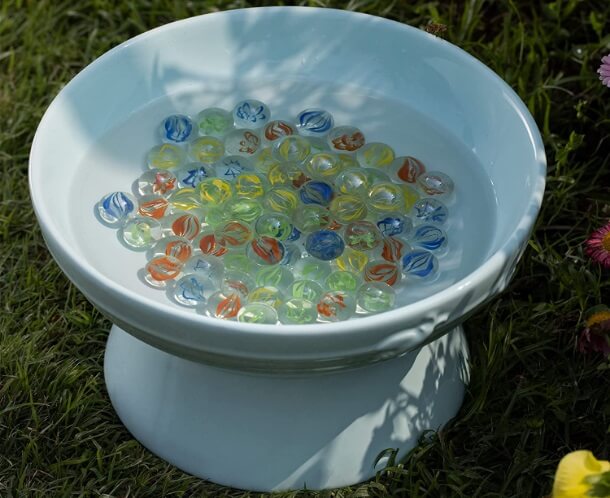
4.4 stars on Amazon
This beautiful bowl is ceramic and comes with 80 glass marbles.
It’s light blue, which is an attractive color to bees and other pollinators. The marbles are colorful and sparkle nicely in the sun.
So it doubles as a bee watering station while also being an attractive addition to your flower beds.
Simply place this bee watering bowl in your garden and fill it up halfway. Then enjoy watching your local bees take a sip.
In summary:
This bee waterer is a steal for the price because it’s good quality. It’s about 8″ in diameter and 4.75″ high. Your local birds won’t show much interest in it, which is good because it’s meant for bees.
The bowl itself is dishwasher safe, which makes cleanup easy. To clean the marbles, you can let them soak in a soapy water mixture then rinse them well.
2. Bee Water Dispenser
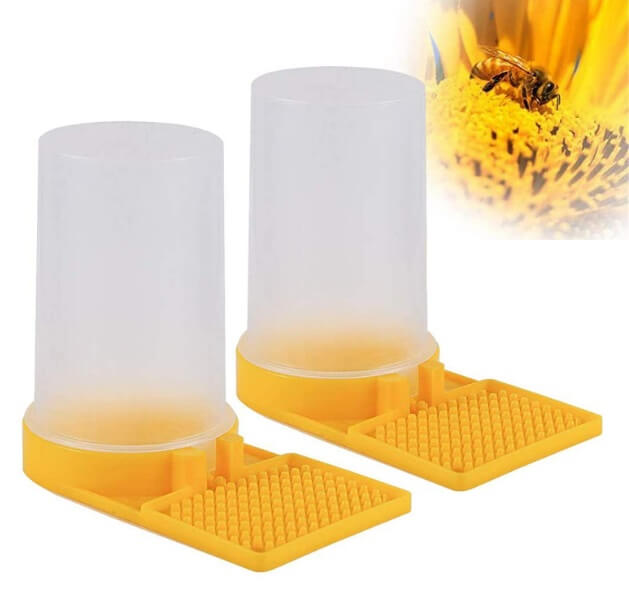
4.1 stars on Amazon
This water dispenser is a simple way to give your bees access to water.
It comes with two small feeders that are made of durable plastic.
Keep in mind:
While these feeders are small, so are bees. So it holds a lot of water for bees and isn’t too small for its purpose.
Also, these honeybee water stations hold enough water so you don’t have to refill them every day. Although with that in mind, it is smart to check your water feeders regularly.
3. BestNest Waterer
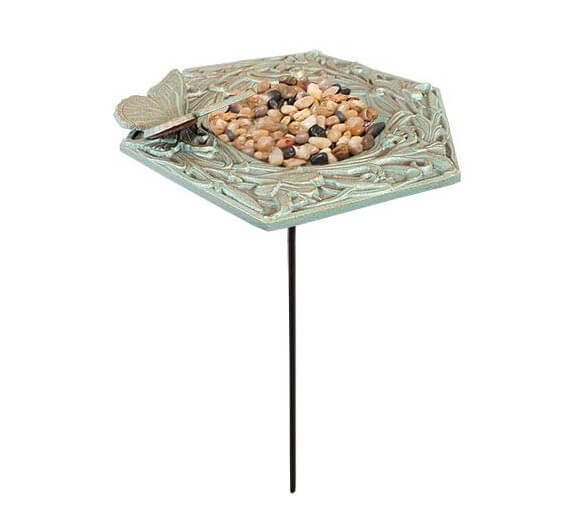
4.2 stars on Amazon
While the description of this waterer says it’s for butterflies, it can still be used for bees.
It has both perches on the sides and small pebbles for the bees to land on. It’s easy to put together and only takes a few minutes.
It does become top-heavy when filled with pebbles and water. Thankfully, bees are lightweight, and this bee waterer is plenty sturdy for them.
4. The Bee Bar’s Bee Puddler
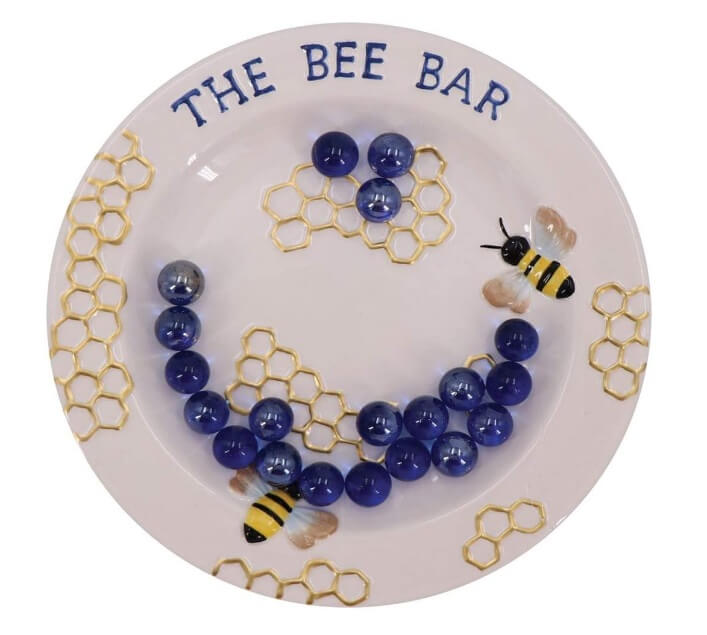
5 stars on Amazon
Nothing says adorable like this decorative bee plate. It’s a simple design that includes blue marbles and colorful designs to attract your bees attention.
It’s made of ceramic and has a diameter of 8 inches. Just add the marbles, fill it up with water, and voila!
FAQs About Bee Waterers
- What is a bee water station, anyway?
- How do you attract bees to a new water source?
- Should you leave water for bees?
- Where should I put water for bees?
- Do honeybees like birdbaths?
- Do bees drink from ponds?
- How much water does a bee drink in a day?
- How close do bees need to be to water?
- Do bees need water in winter?
- How do I keep bees from drowning in my birdbath?
- Should I add sugar to my bee waterer?
What is a bee water station, anyway?
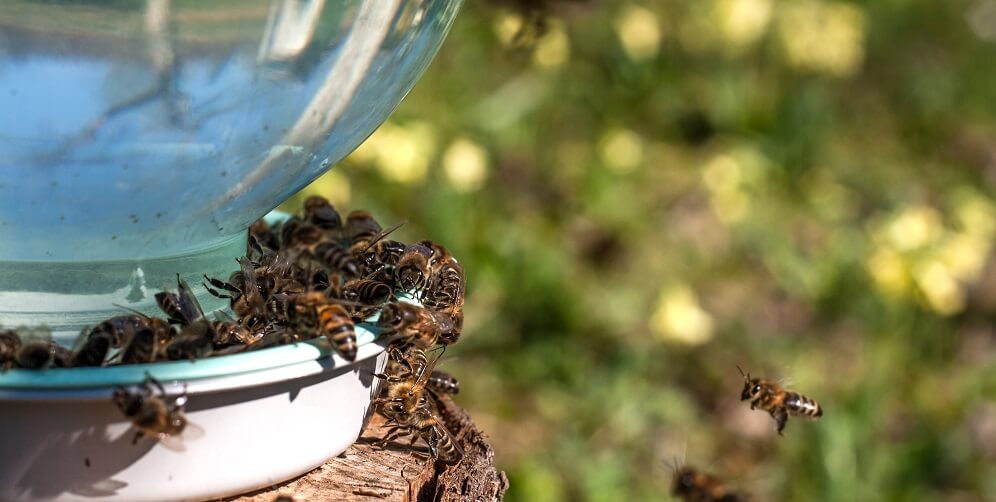
Simply put, a bee waterer is a safe place where your bees can access water.
This allows your local bees (or beehive if you’re a beekeeper) to drink clean water from non-contaminated sources.
Bee waterers are simple to make. They’re usually just a birdbath or bowl filled with marbles or rocks. But, they can make a huge difference in maintaining a healthy bee population in your area.
Bees, like humans, need water to survive.
But not only that.
Honeybees, for example, use water to control the temperature and humidity of their hive. They also use it to feed baby bees and to dilute their honey.
—> Go back to the FAQs about bee waterers
How do you attract bees to a new water source?
To learn how to attract bees to a water source, you have to think like a bee. Bees often find their water and food sources by scent.
And believe it or not:
Bees actually prefer water with a strong smell. That’s why they’re attracted to ponds, pools, and ditch water.
And that’s also why a common question we get is:
Do honeybees like saltwater?
The answer is yes because the smell grabs their attention.
But now you might be asking one of the following:
Well, what is a good water source for bees?
What can I do to get bees attracted to my waterer?
How do I attract bees to my water source?
Good questions.
Here are a few things you can add to your bee waterer to get their attention:
- A few drops of lemongrass oil
- A few dashes of salt
- A few drops of chlorine
Once your bees find the water source, you can stop adding the attractant to your bee water fountain. It’s just a means of getting their attention so they keep coming back.
Related: How Many Bees are in a Hive?
—> Go back to the FAQs about bee waterers
Should you leave water for bees?
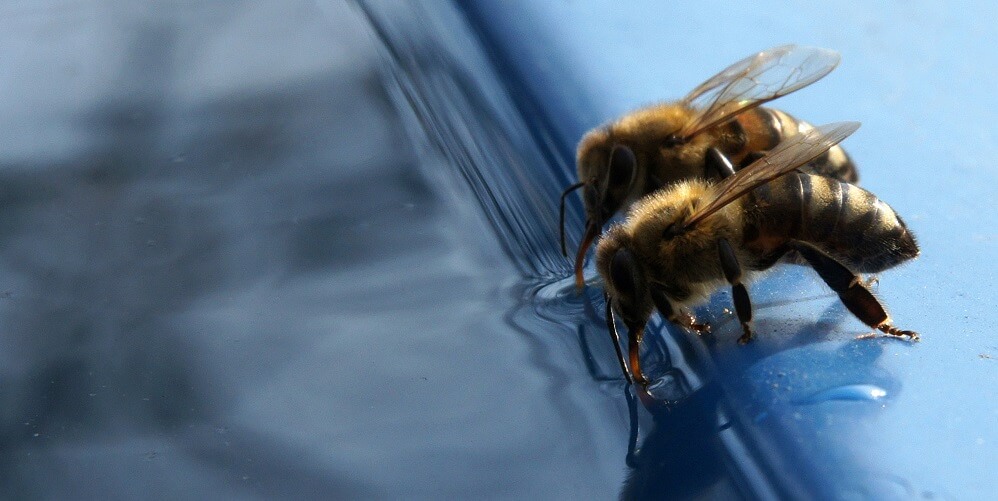
Absolutely! It’s always a good idea to help your local bee population or beehive if you’re a beekeeper.
Bees need water to survive. And if there are no good water sources close by, sometimes bees will drink from pools which can irritate homeowners.
Providing water sources for bees is also beneficial if you have a garden or flower beds. The bees will do you a favor by pollinating your plants.
—> Go back to the FAQs about bee waterers
Where should I put water for bees?
Near your flower beds or garden is the best place to put your bee waterer. You can also stick your bee watering station in an open location in your yard.
Be careful about placing your bee waterers near hummingbird feeders. Keeping them separated ensures that both bees and hummingbirds have their own safe space for eating and drinking.
And if you don’t want bees buzzing around your porch, make sure to place the bee waterer a few feet away from your home.
—> Go back to the FAQs about bee waterers
Do honeybees like birdbaths?
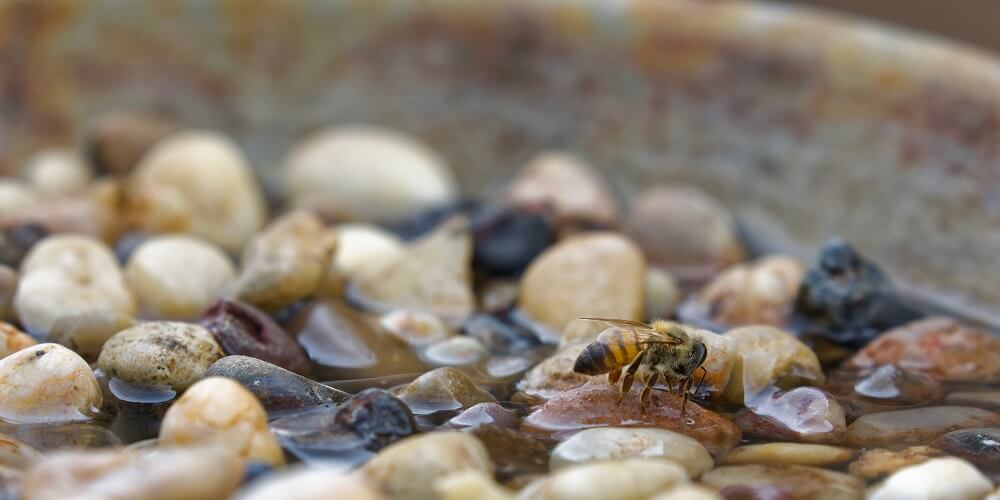
Yes, they do.
And as long as there are rocks, marbles, or crystals where the honeybees can safely perch to drink water, then go for it. Birdbaths make a great addition to a bee-friendly garden.
Keep in mind:
If you’re a beekeeper using a bee waterer to help your hive, then make sure you have your bee suit and bee smoker handy for extra protection. Also, learn about the different types of hives, like the horizontal hive, for example.
—> Go back to the FAQs about bee waterers
Do bees drink from ponds?
Yes, they do.
Bees drink from ponds, creeks, lakes, and so on. Those are considered their natural water resource.
This is also what people mean when they ask, “Do bees like dirty water?” or “Do honeybees like saltwater?”
While the water is considered dirty or salty by human standards, it isn’t for the bees. As long as the pond, creek, or lake isn’t contaminated by chemicals, then it’s completely safe for a bee to drink from it.
—> Go back to the FAQs about bee waterers
More to Explore:
How much water does a bee drink in a day?
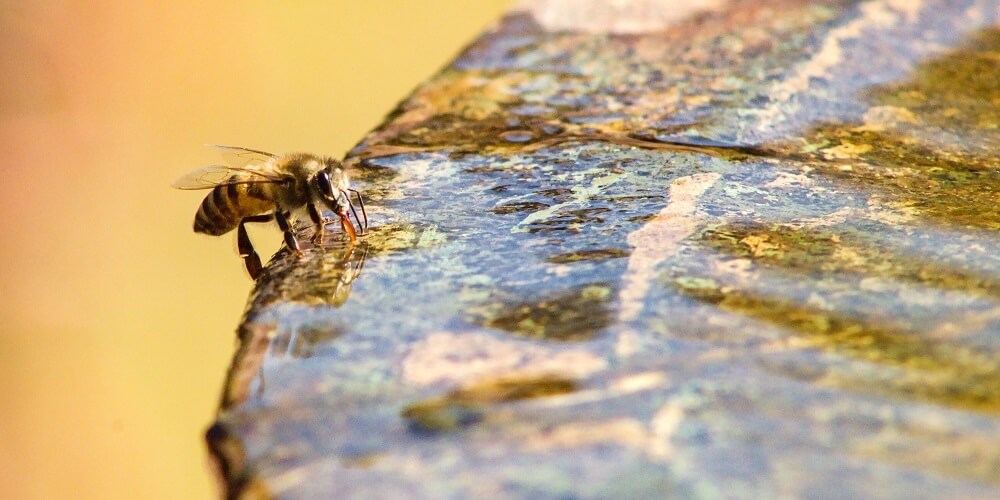
“Do bees drink a lot of water?” and “How much do bees drink?” are common questions.
And while we don’t have exact measurements on how much water bees drink, I can tell you this:
Like humans, the bodies of bees are mostly water. So just like water is important for us, it’s also important for bees.
And also, bees use water for more than just drinking.
For starters, bees use water to regulate the temperature of their hive.
They bring water home and spread it over the brood. Then, the in-hive worker bees fan their wings to create airflow throughout the hive. This cools the hive down during hot summer months.
Bees also use water to feed baby bees.
And lastly, bees use water to dilute their honey during the winter. Honey can crystallize in cool temperatures, so adding water helps bring it back to a liquid.
—> Go back to the FAQs about bee waterers
More to Explore:
How close do bees need to be to water?
Fun fact:
Bees will travel up to five miles to find water.
Crazy, right?
Chances are, you probably have bees in your area, even if you don’t realize it. That’s why if you want to promote a healthy bee population, giving your bees access to water will help.
Also, planting the best flowers for bees will make a huge difference and your bees will thank you.
If you’re low on nectar-producing flowers in your area, try making sugar water for bees. This can help new or weak colonies survive.
—> Go back to the FAQs about bee waterers
More to Explore:
Do bees need water in winter? Do bees drink water in the winter?
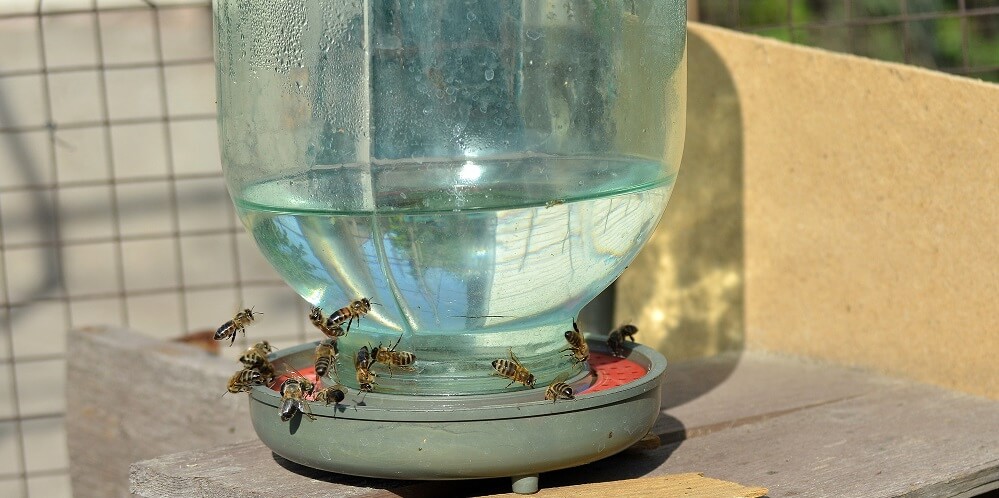
Yes, bees still need water in the winter to help them through the long cold months.
Now you might be asking:
Why is it important to provide a water source for bees in the winter?
Well, because like humans, bees need water to survive.
They also use water for more than just drinking. In fact, honeybees use water in the winter to help decrystallize their honey. When temperatures drop below 50ºF (10ºC), the honey starts to become solid.
But that doesn’t mean the honey has expired. It’s just gone from a liquid to a solid, and the bees have to thin it out.
So, in a nutshell?
Keep safe bee watering stations out all year long. Not only will you help the bees, but you’ll help local plants in your area since a healthy bee population helps them thrive.
Related: What Does a Queen Bee Look Like?
—> Go back to the FAQs about bee waterers
More to Explore:
How do I keep bees from drowning in my birdbath? How do you make a birdbath bee-friendly?
“How do you make a birdbath for bees?” or “How do you make a water bowl for bees?” are common questions.
Remember:
Bees need a place to perch while they drink water because they can’t swim. Unfortunately, that’s why it’s common to find dead bees floating around in birdbaths.
But here’s the good news:
There is an easy fix.
So if you’ve ever asked yourself, “How do you make a bee watering station?” or “How do you feed bees water?”, then here’s your answer:
All you have to do is fill a shallow birdbath or bowl with rocks, marbles, or crystals. Make sure the waterline is below the objects so the bees can land safely on them.
And that’s all!
You’ve created a safe DIY honeybee watering station.
—> Go back to the FAQs about bee waterers
More to Explore:
Should I add sugar or honey to my bee waterer?
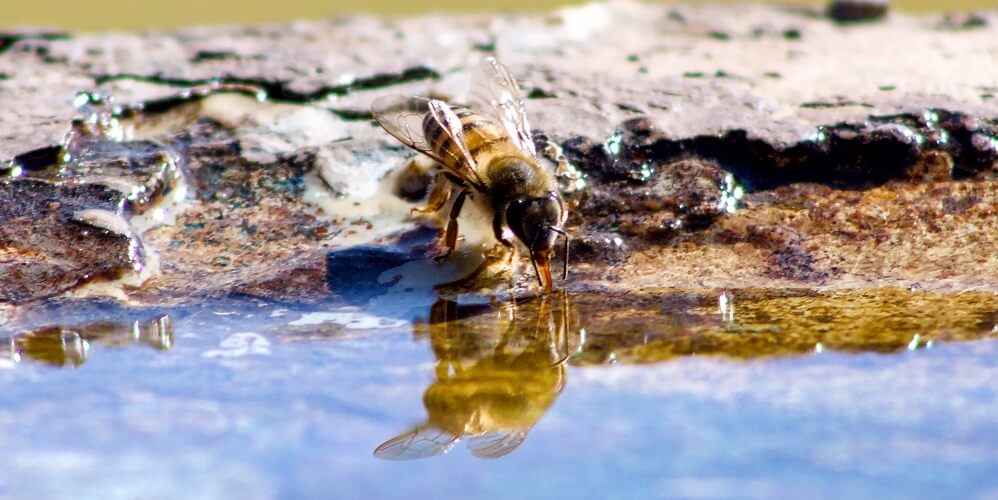
Good question.
If you want to be both a food and water source for your bees, then you can have two separate feeders:
- A feeder for water only so they can drink
- A feeder for sugar water so they can eat
With that in mind, the best way to feed your bees is to plant the best flowers for bees. But if you don’t have a green thumb, putting out sugar water will help.
Don’t give your bees honey because other bees may find it and it can spread diseases amongst hives. This is a common question we get after beekeepers use honey extractors or flow hives to harvest honey.
